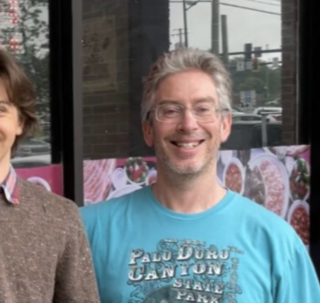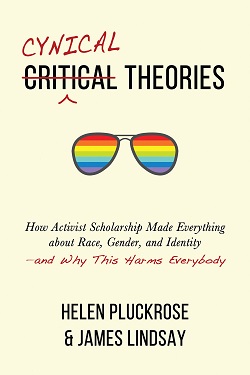The Sokal affair, also called the Sokal hoax, was a demonstrative scholarly hoax performed by Alan Sokal, a physics professor at New York University and University College London. In 1996, Sokal submitted an article to Social Text, an academic journal of cultural studies. The submission was an experiment to test the journal's intellectual rigor, specifically to investigate whether "a leading North American journal of cultural studies—whose editorial collective includes such luminaries as Fredric Jameson and Andrew Ross—[would] publish an article liberally salted with nonsense if (a) it sounded good and (b) it flattered the editors' ideological preconceptions."

Bryan Douglas Caplan is an American economist and author. He is a professor of economics at George Mason University, a senior research fellow at the Mercatus Center, adjunct scholar at the Cato Institute, and a former contributor to the Freakonomics blog and EconLog. He currently publishes his own blog, Bet on It. Caplan is a self-described "economic libertarian". The bulk of Caplan's academic work is in behavioral economics and public economics, especially public choice theory.

National Review is an American conservative editorial magazine, focusing on news and commentary pieces on political, social, and cultural affairs. The magazine was founded by William F. Buckley Jr. in 1955. Its editor-in-chief is Rich Lowry, and its editor is Ramesh Ponnuru.

The New Republic is an American magazine focused on domestic politics, news, culture, and the arts, with ten magazines a year and a daily online platform. The New York Times described the magazine as partially founded in Teddy Roosevelt's living room and known for its "intellectual rigor and left-leaning political views."

In American politics, a Libertarian Republican is a politician or Republican Party member who has advocated libertarian policies while typically voting for and being involved with the Republican Party.

Thomas Ernest Woods Jr. is an American author, podcast host, and libertarian commentator who is currently a senior fellow at the Mises Institute. A proponent of the Austrian School of economics, Woods hosts a daily podcast, The Tom Woods Show, and formerly co-hosted the weekly podcast Contra Krugman.
Jack Shafer is an American journalist who most recently wrote about media for Politico. Prior to joining Politico, he worked for Reuters and also edited and wrote the column "Press Box" for Slate, an online magazine. Before his stay at Slate, Shafer edited two city weeklies, Washington City Paper and SF Weekly. Much of Shafer's writing focuses on what he sees as a lack of precision and rigor in reporting by the mainstream media, which he says "thinks its duty is to keep you cowering in fright." One frequent topic is media coverage of the War on Drugs.

In the United States, libertarianism is a political philosophy promoting individual liberty. According to common meanings of conservatism and liberalism in the United States, libertarianism has been described as conservative on economic issues and liberal on personal freedom, often associated with a foreign policy of non-interventionism. Broadly, there are four principal traditions within libertarianism, namely the libertarianism that developed in the mid-20th century out of the revival tradition of classical liberalism in the United States after liberalism associated with the New Deal; the libertarianism developed in the 1950s by anarcho-capitalist author Murray Rothbard, who based it on the anti-New Deal Old Right and 19th-century libertarianism and American individualist anarchists such as Benjamin Tucker and Lysander Spooner while rejecting the labor theory of value in favor of Austrian School economics and the subjective theory of value; the libertarianism developed in the 1970s by Robert Nozick and founded in American and European classical liberal traditions; and the libertarianism associated with the Libertarian Party, which was founded in 1971, including politicians such as David Nolan and Ron Paul.
The Rockford Institute was an American conservative think-tank associated with paleoconservatism, based in Rockford, Illinois. Founded in 1976, it ran the John Randolph Club and published the magazine Chronicles. In 2018 the Rockford Institute merged with the Charlemagne Institute, which became the new publisher of Chronicles. The Charlemagne Institute describes itself as "leading a cultural movement to defend and advance Western Civilization, the foundation of our American republic."

In American politics, a libertarian Democrat is a member of the Democratic Party with political views that are relatively libertarian compared to the views of the national party.
Criticism of postmodernism is intellectually diverse, reflecting various critical attitudes toward postmodernity, postmodern philosophy, postmodern art, and postmodern architecture. Postmodernism is generally defined by an attitude of skepticism, irony, or rejection towards what it describes as the grand narratives and ideologies associated with modernism, especially those associated with Enlightenment rationality. Thus, while common targets of postmodern criticism include universalist ideas of objective reality, morality, truth, human nature, reason, science, language, and social progress, critics of postmodernism often defend such concepts.

Jordan Bernt Peterson is a Canadian psychologist, author, and media commentator. He began to receive widespread attention in the late 2010s for his views on cultural and political issues. Often characterized as conservative, Peterson has described himself as a classic British liberal and a traditionalist.

Curtis Guy Yarvin, also known by the pen name Mencius Moldbug, is an American blogger. He is known, along with philosopher Nick Land, for founding the anti-egalitarian and anti-democratic philosophical movement known as the Dark Enlightenment or neo-reactionary movement (NRx).

Claire Lehmann is an Australian journalist and the founding editor of Quillette.
The intellectual dark web (IDW) is a term used to describe a loose affiliation of academics and social commentators who oppose the perceived influence of left wing–associated identity politics and political correctness in higher education and mass media.

Debra W. Soh is a Canadian columnist, author, and former academic sex researcher.

The grievance studies affair was the project of a team of three authors—Peter Boghossian, James A. Lindsay, and Helen Pluckrose—to highlight what they saw as poor scholarship and erosion of standards in several academic fields. Taking place over 2017 and 2018, their project entailed submitting bogus papers to academic journals on topics from the field of critical social theory such as cultural, queer, race, gender, fat, and sexuality studies to determine whether they would pass through peer review and be accepted for publication. Several of these papers were subsequently published, which the authors cited in support of their contention.

James Stephen Lindsay, known professionally as James A. Lindsay, is an American author. He is known for the grievance studies affair, in which he, Peter Boghossian and Helen Pluckrose submitted hoax articles to academic journals in 2017 and 2018 to test scholarship and rigor in several academic fields. Lindsay has written several books including Cynical Theories (2020), which he co-authored with Pluckrose. He has promoted right-wing conspiracy theories such as Cultural Marxism and LGBT grooming conspiracy theories.

Cynical Theories: How Activist Scholarship Made Everything About Race, Gender, and Identity—and Why This Harms Everybody is a nonfiction book by Helen Pluckrose and James Lindsay, published in August 2020. The book was listed on the bestsellers lists of Publishers Weekly, USA Today, and the Calgary Herald.
"Why Women Don't Code" is an essay by University of Washington computer science lecturer Stuart Reges, published in Quillette in June, 2018. The essay, addressing gender disparity in computing, became "one of the most read" items posted in Quillette in 2018 after a link to it was tweeted by Jordan Peterson.












